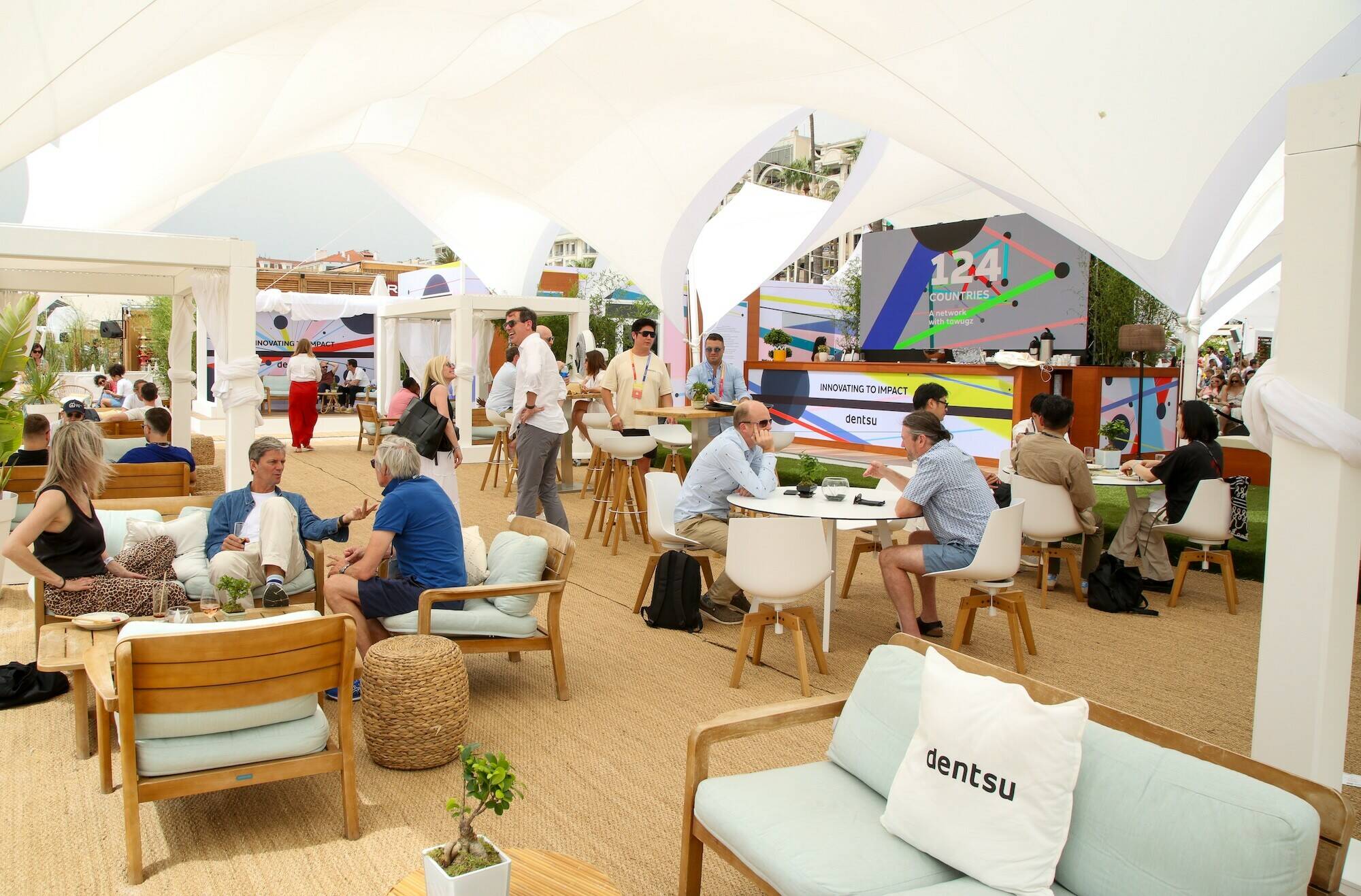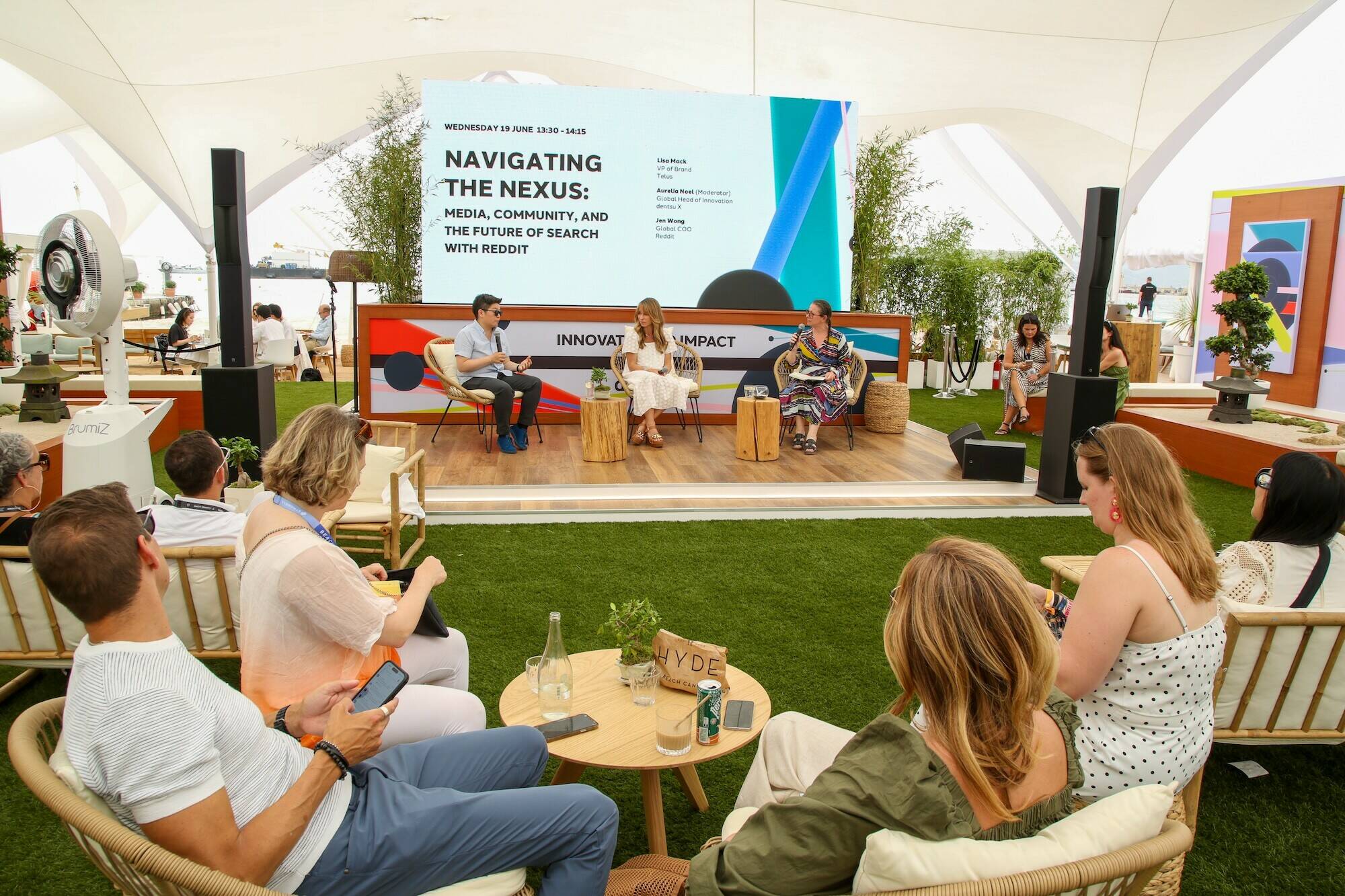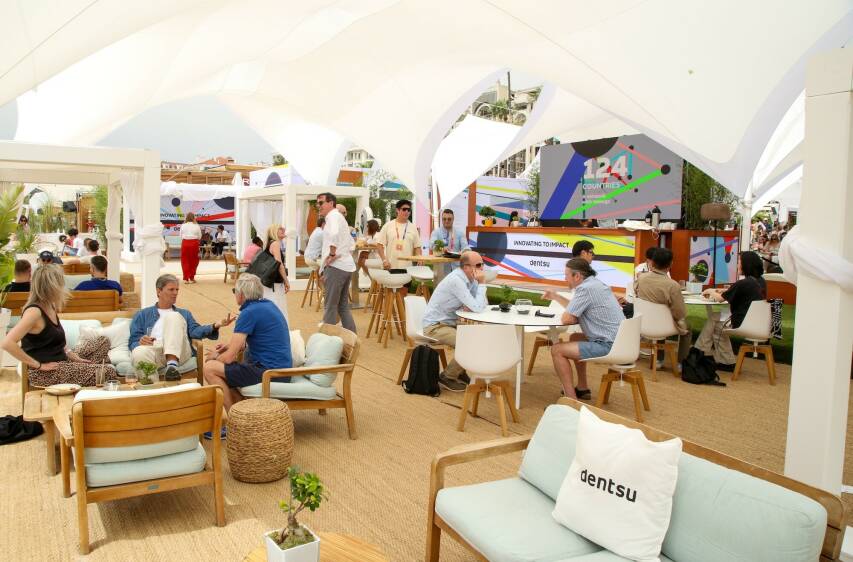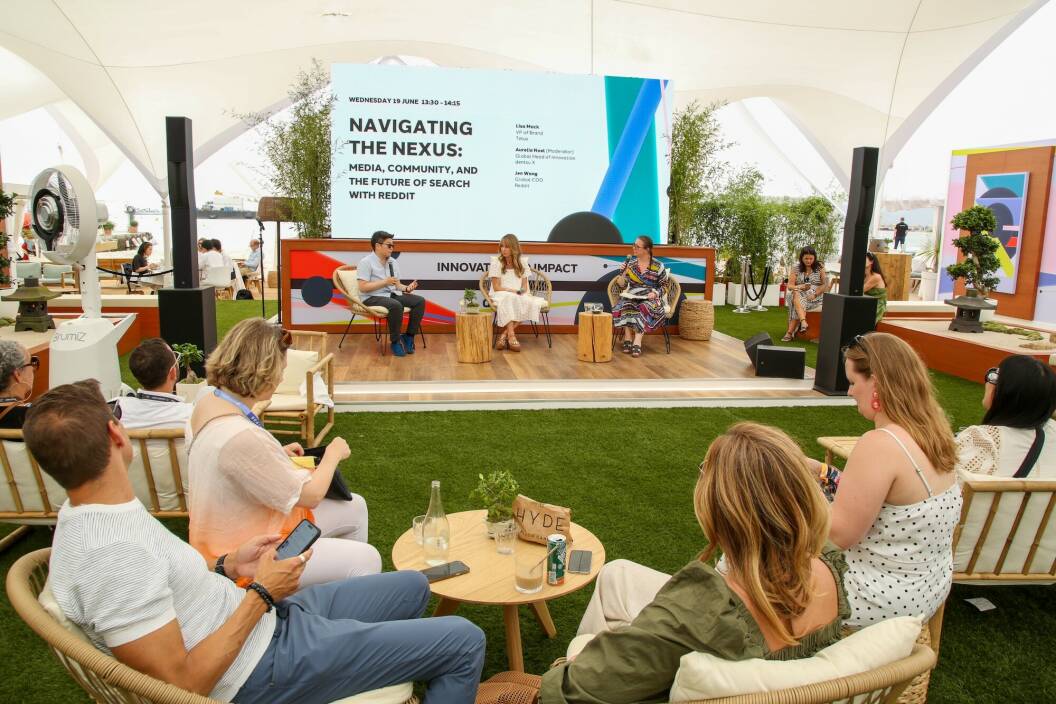
WEDNESDAY 19TH
DAILY RECAP
Connecting Brands and Communities Through Conversational Media
On Wednesday morning, a dentsu Beach House session, ‘Pioneering Media to Impact’, remarked on how media is moving up the value chain in marketing and advertising, from being something that CMOs and their teams used to tackle at the end of their projects to often being what they start with. This increasingly elevated position is dependent on the expansion and evolution of the media ecosystem beyond a collection of surfaces to project upon to capture eyeballs and into a dynamic set of engagement modes that allows brands to establish a form of dialogue with consumers. In fact, for some brands, remarked Beatrice Cornacchia, EVP, Marketing and Communications, Europe at Mastercard, media is “the only way we have to engage in a conversation with consumers and communities.
As a result, media’s potential to be a change agent is now starting to be fully realized. Kraft Heinze’s recent campaign for Plasmon in Italy, ‘Adamo 2050’, is a great example of this: a mockumentary commercial imagining life for the last baby born in Italy in 2050 should births continue to decline at the current rate, it sparked a national debate that led corporations to update their maternity and paternity leave policies and the government to update its legislation.
Media’s ability to spark conversations and ignite communities was, in almost a self-reflective way, at the core of the success of JC Decaux’s campaign ‘Meet Marina Prieto’, which was awarded the Grand Prix in Creative B2B. The Spanish billboard advertising company was facing a decline in bookings, so it started featuring photos from the social feed of Marina Prieto, a 100-hundred-year-old woman with 28 followers on Instagram. The buzz that followed this stunt reminded businesses of the effectiveness of billboards and, at the same time, made Marina extremely popular on social media.
Perhaps one of the purest and most groundbreaking examples of media bringing brands and communities closer together, ‘More Than That with Gia Peppers’, was celebrated in the evening in the session ‘Driving Equality and Impact through Branded Storytelling’. Dentsu’s award-winning radio series and Limited TV Series sought to disrupt the advertising supply chain by bringing together a coalition of integrated brand partners, diverse suppliers and storytellers and is about to launch its 4th season.
Powering Human-Centred Experiences through Data and Tech
While we often worry that an over-reliance on AI-led optimization may open the gates to a de-humanized future, Cannes work keeps reminding us of data and technology’s ability to unlock profoundly human experiences. Mastercard’s ‘Room for Everyone’ – which was awarded the Grand Prix in Creative Data as well as a Gold in Direct – addressed concerns emerging in Poland around Ukrainian-refugee immigration and the resulting increase in Ukrainian-owned businesses and the effects this growth may have on Polish-owned businesses. Based on a complementarity data model, Mastercard’s platform pinpoints mutually beneficial locations (e.g., barbershops next to restaurants attract more clients, etc.) to get Polish entrepreneurs to invite Ukrainians to open businesses near theirs.
On the other hand, Heineken’s ‘Pub Museums’, which was awarded Gold Lions in the Direct, Creative B2B, and Outdoor categories, used AR to launch online museums in order to preserve Ireland’s oldest pubs (the original conversational media connecting communities, in a way), which are facing financial hardships.
Going beyond humans, PetPace’s ‘Animal Alerts’, which was awarded a Gold Lion in Media, as well as Silver Lions in both Media and Creative Data, aims to leverage dogs and their health data to develop an earthquake early warning system. This project is still in its pilot phase but, if proved out, is likely to win even more awards at next year’s Cannes Lions.
The ‘Less Is More’ Design Rule Rules Even More This Year
Minimalism is not a new trend in design, but this year Cannes Lions celebrated some truly remarkable work that obeyed the old ‘less is more’ adage. Sol Cement’s ‘Sightwalks’ – awarded the Grand Prix in Design among too many prizes to mention – enhanced tactile paving, the universal design system used to help visually impaired people walk out in the street, to indicate not only whether to stop or continue walking, but also provide additional information on the surroundings (e.g., am I near a restaurant? A bank? Etc.)
Consul, a Brazilian washing machine brand, noticed that the country’s football clubs dealt with financial hardship by over-relying on sponsorships. What better way to remind fans of their products than ‘cleaning up’ jerseys by removing aesthetically displeasing, clashing logos? With ‘Clean Sponsorship’, Consul paid Juventus, one of Brazil’s oldest clubs, the amount they were aiming to raise through multiple sponsorships to let them play with a pristine, neat, commercial-free jersey design. The project was awarded Gold Lions in both the Media and Outdoors categories.
Finally, Spotify decided to unlock the creative potential of productive tools we don’t normally associate with artistic expression by developing a stunning and incredibly visual music video entirely and solely using native Microsoft Excel capabilities. Among several awards, ‘Spreadbeats’ won Spotify the Grand Prix in Digital Craft.





TUESDAY 18th
DAILY RECAP

Connecting Brands and Communities Through Conversational Media
On Wednesday morning, a dentsu Beach House session, ‘Pioneering Media to Impact’, remarked on how media is moving up the value chain in marketing and advertising, from being something that CMOs and their teams used to tackle at the end of their projects to often being what they start with. This increasingly elevated position is dependent on the expansion and evolution of the media ecosystem beyond a collection of surfaces to project upon to capture eyeballs and into a dynamic set of engagement modes that allows brands to establish a form of dialogue with consumers. In fact, for some brands, remarked Beatrice Cornacchia, EVP, Marketing and Communications, Europe at Mastercard, media is “the only way we have to engage in a conversation with consumers and communities.
As a result, media’s potential to be a change agent is now starting to be fully realized. Kraft Heinze’s recent campaign for Plasmon in Italy, ‘Adamo 2050’, is a great example of this: a mockumentary commercial imagining life for the last baby born in Italy in 2050 should births continue to decline at the current rate, it sparked a national debate that led corporations to update their maternity and paternity leave policies and the government to update its legislation.
Media’s ability to spark conversations and ignite communities was, in almost a self-reflective way, at the core of the success of JC Decaux’s campaign ‘Meet Marina Prieto’, which was awarded the Grand Prix in Creative B2B. The Spanish billboard advertising company was facing a decline in bookings, so it started featuring photos from the social feed of Marina Prieto, a 100-hundred-year-old woman with 28 followers on Instagram. The buzz that followed this stunt reminded businesses of the effectiveness of billboards and, at the same time, made Marina extremely popular on social media.

Perhaps one of the purest and most groundbreaking examples of media bringing brands and communities closer together, ‘More Than That with Gia Peppers’, was celebrated in the evening in the session ‘Driving Equality and Impact through Branded Storytelling’. Dentsu’s award-winning radio series and Limited TV Series sought to disrupt the advertising supply chain by bringing together a coalition of integrated brand partners, diverse suppliers and storytellers and is about to launch its 4th season.
Powering Human-Centred Experiences through Data and Tech
While we often worry that an over-reliance on AI-led optimization may open the gates to a de-humanized future, Cannes work keeps reminding us of data and technology’s ability to unlock profoundly human experiences. Mastercard’s ‘Room for Everyone’ – which was awarded the Grand Prix in Creative Data as well as a Gold in Direct – addressed concerns emerging in Poland around Ukrainian-refugee immigration and the resulting increase in Ukrainian-owned businesses and the effects this growth may have on Polish-owned businesses. Based on a complementarity data model, Mastercard’s platform pinpoints mutually beneficial locations (e.g., barbershops next to restaurants attract more clients, etc.) to get Polish entrepreneurs to invite Ukrainians to open businesses near theirs.
On the other hand, Heineken’s ‘Pub Museums’, which was awarded Gold Lions in the Direct, Creative B2B, and Outdoor categories, used AR to launch online museums in order to preserve Ireland’s oldest pubs (the original conversational media connecting communities, in a way), which are facing financial hardships.
Going beyond humans, PetPace’s ‘Animal Alerts’, which was awarded a Gold Lion in Media, as well as Silver Lions in both Media and Creative Data, aims to leverage dogs and their health data to develop an earthquake early warning system. This project is still in its pilot phase but, if proved out, is likely to win even more awards at next year’s Cannes Lions.
The ‘Less Is More’ Design Rule Rules Even More This Year
Minimalism is not a new trend in design, but this year Cannes Lions celebrated some truly remarkable work that obeyed the old ‘less is more’ adage. Sol Cement’s ‘Sightwalks’ – awarded the Grand Prix in Design among too many prizes to mention – enhanced tactile paving, the universal design system used to help visually impaired people walk out in the street, to indicate not only whether to stop or continue walking, but also provide additional information on the surroundings (e.g., am I near a restaurant? A bank? Etc.)
Consul, a Brazilian washing machine brand, noticed that the country’s football clubs dealt with financial hardship by over-relying on sponsorships. What better way to remind fans of their products than ‘cleaning up’ jerseys by removing aesthetically displeasing, clashing logos? With ‘Clean Sponsorship’, Consul paid Juventus, one of Brazil’s oldest clubs, the amount they were aiming to raise through multiple sponsorships to let them play with a pristine, neat, commercial-free jersey design. The project was awarded Gold Lions in both the Media and Outdoors categories.
Finally, Spotify decided to unlock the creative potential of productive tools we don’t normally associate with artistic expression by developing a stunning and incredibly visual music video entirely and solely using native Microsoft Excel capabilities. Among several awards, ‘Spreadbeats’ won Spotify the Grand Prix in Digital Craft.


